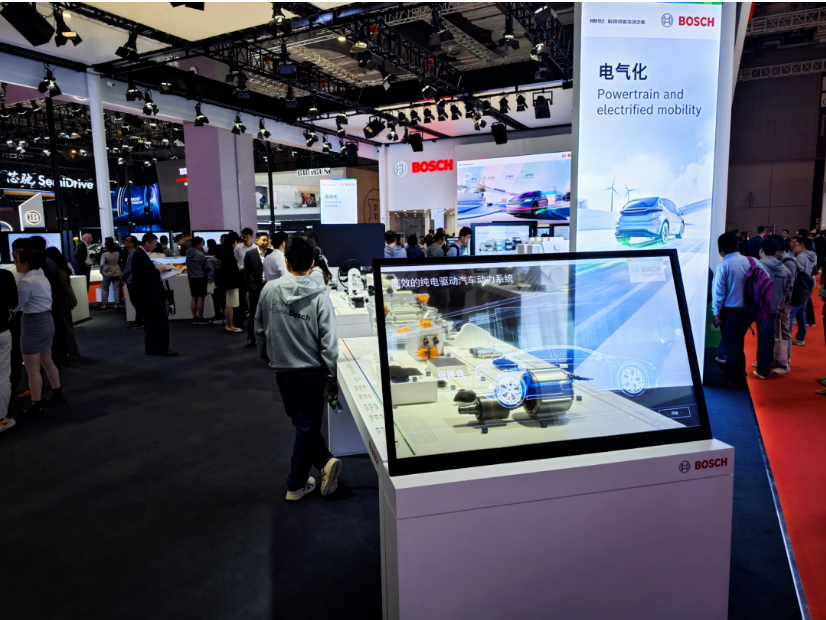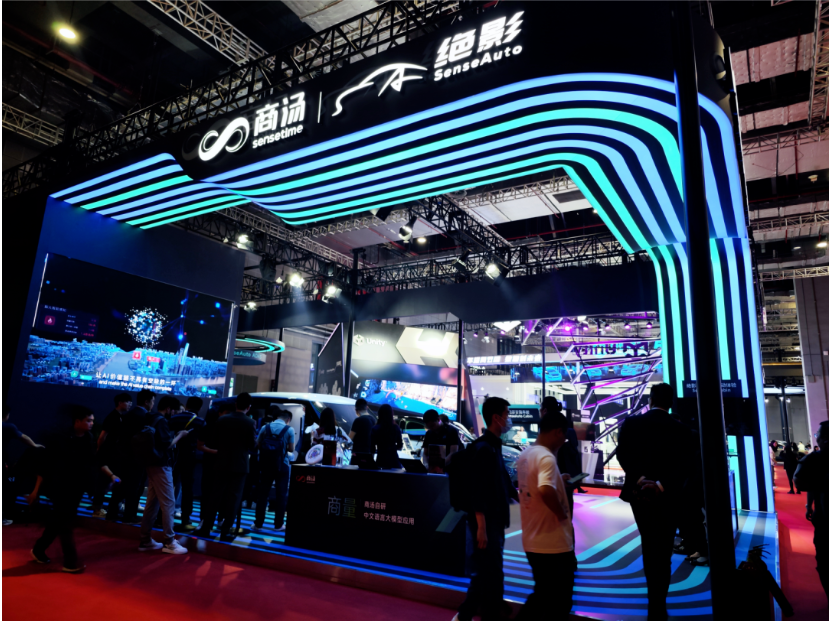
Auto Shanghai 2023 burst with amazing energy, with more than a thousand companies on show and over 150 new cars debuting. In addition to vehicles, the lineups of auto technology and supply chain exhibitors has been expanded from two pavilions, when they were first set up as a separate exhibition in 2021, to three pavilions. As the electrification and intelligence of the auto industry continues to progress, enterprises of auto technology and supply chain are also “Key Players”.
Intelligent vehicles rapid innovation
According to Car Insight’s preliminary statistics, the ratio of NEV to ICE at Auto Shanghai 2023 is about 7:3. And it’s shown that there is no longer any distinction between NEV and ICE with different levels of intelligent configurations on board. Such changes are also quickly reflected in the auto industry chain.
According to the statistics, the market penetration rate of new energy passenger vehicles in China exceeded 26% in the first quarter of this year, and the NEV market is ready for competition in the second half of the “intelligence” market. 2023 McKinsey China Consumer Report shows that 75% of consumers have a need for high-speed intelligent driving and 60% have a need for urban intelligent driving.
It’s also revealed through Car Insight staff’s visit and inquiry at the show that suppliers in the industry chain focuses on areas like intelligent body control, intelligent driving systems and high-precision maps, so they were making every effort to show off their skills, intensively unveiling new products and delivering new strategies.
 Photo credit:Car Insight
Photo credit:Car Insight
Bosch showcases innovative solutions for software-defined vehicles and electrification to enhance their localization. As we can see, the debuted innovation Information Domain Computer 4.0 was developed by Bosch’s local team. Besides, ZF Friedrichshafen AG and Continental brought their HoloPilot+HoloParking system solution, as well as solutions for 4D imaging radar and for a cloud data management platform for autonomous driving and driving assistance development.
As for future mobility area, Huawei, Baidu Apollo, Didi and other companies were also present, bringing their latest technological achievements in the fields of chips, radar, ADAS, autonomous driving solutions, high precision maps, etc., accelerating the cross-border integration of the auto industry with fields like new technologies and materials.
Auto intelligence is an arena where many exhibitors showed off their “muscles”. From the viewpoint of the technologies on display, the rate of installation of advanced hardware on board such as chips with whopping computing power and LIDAR was increasing, with the intention of bringing consumers a better driving experience.
As the basis for intelligent driving, on-board chips have also attracted attention, especially high-performance smart chips. In addition, chip companies have already made comprehensive plans and proposed a solution of “Intelligent driving + intelligent cockpit” integration.
Horizon Robotics released its BPU, a dedicated computing architecture for smart driving based on a combination of hardware and software, and Black Sesame Technologies announced the world’s first cross-domain computing platform for smart cars, the Wudang series, which, in terms of cross-domain computing scenarios, perfectly covers the needs of many different domains within smart cars such as cockpit and smart driving, and has the capability of multi-domain convergence.
Such integrated solutions reflect the future product trends of the industry chain companies. According to McKinsey’s report, the intelligence of NEV has become a key demand that every company in the auto industry chain must pay attention to. Capability of carrying out forward-looking layout investment and offering rapid response helps companies gradually obtain an advantage in the competition, so that they can temporarily seize the first opportunity in the global wave of automotive intelligence and electrification.
“ChatGPT in Cars”
ChatGPT’s launch has not only provoked huge waves in the technology world, but triggered a “hurricane” in the auto industry. Applying foundation models to cars are expected to bring cars into the era of “user-defined cars”. As a result of foundation models craze, there were more AI-related technologies and products at 2023 Shanghai Auto than ever before.
Zhang Chunhui, vice president of Alibaba and co-CEO of Banma, revealed that Banma Co-Pilot, Banma’s newly released third-generation auto AI capability system, will be first implemented in IM(Intelligence in Motion) cars.
 Photo credit:Car Insight
Photo credit:Car Insight
SenseTime showcased its new smart car solution sub-brand Sense Auto, which provides three major services: intelligent sensing, decision planning and AI cloud. One participant said, “It’s just like having a ChatGPT in the car.”
In addition, how to empower cars more attributes is becoming the direction of exploration for enterprises. Unity China, for example, a platform known for its game engine, has also crossed over to the auto industry, bringing drivers immersive experience. So far, Unity’s intelligent cockpit solution has been widely used in 16 emerging carmakers, represented by NIO, XPeng and Li Auto.
In short, at 2023 Shanghai Auto, in addition to NEV being the absolute key role, Internet companies and component suppliers started to come to the fore as well, promoting the upgrade of software and hardware solutions and accelerating the full outbreak of smart driving products; foundation models started to apply to car end, encouraging cross-border integration between the auto industry and new technologies, materials and other fields.
Translator:Wei Xiong
Reviser:Yan Luo

 Room 1104,Block B,JingBan Building,6 Middle Beisanhuan Road,Xicheng District,Beijing
Room 1104,Block B,JingBan Building,6 Middle Beisanhuan Road,Xicheng District,Beijing
 (8610)62383600
(8610)62383600
 quanqixiang@carresearch.cn
quanqixiang@carresearch.cn
 京公网安备:11010202007638号|京ICP备17032593号-2|Report illegal and bad information:010-65993545-8019 jubao@carresearch.com
京公网安备:11010202007638号|京ICP备17032593号-2|Report illegal and bad information:010-65993545-8019 jubao@carresearch.com
Legal support:Beijing Yingke Law Firm|All rights reserved, DO NOT reproduce without permission